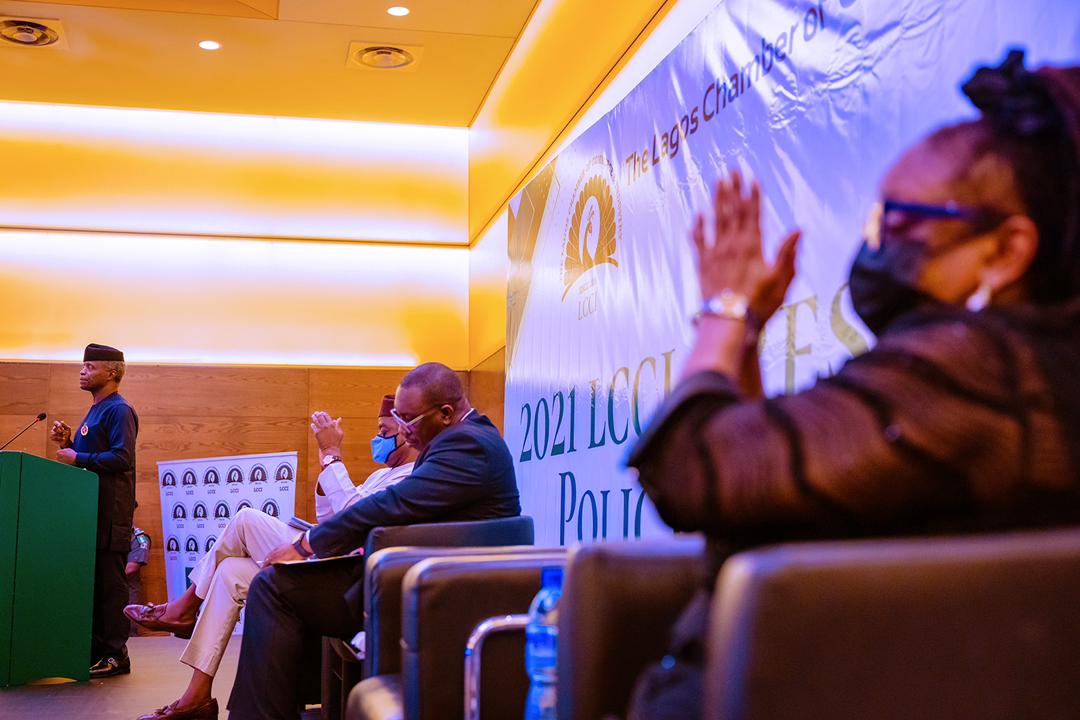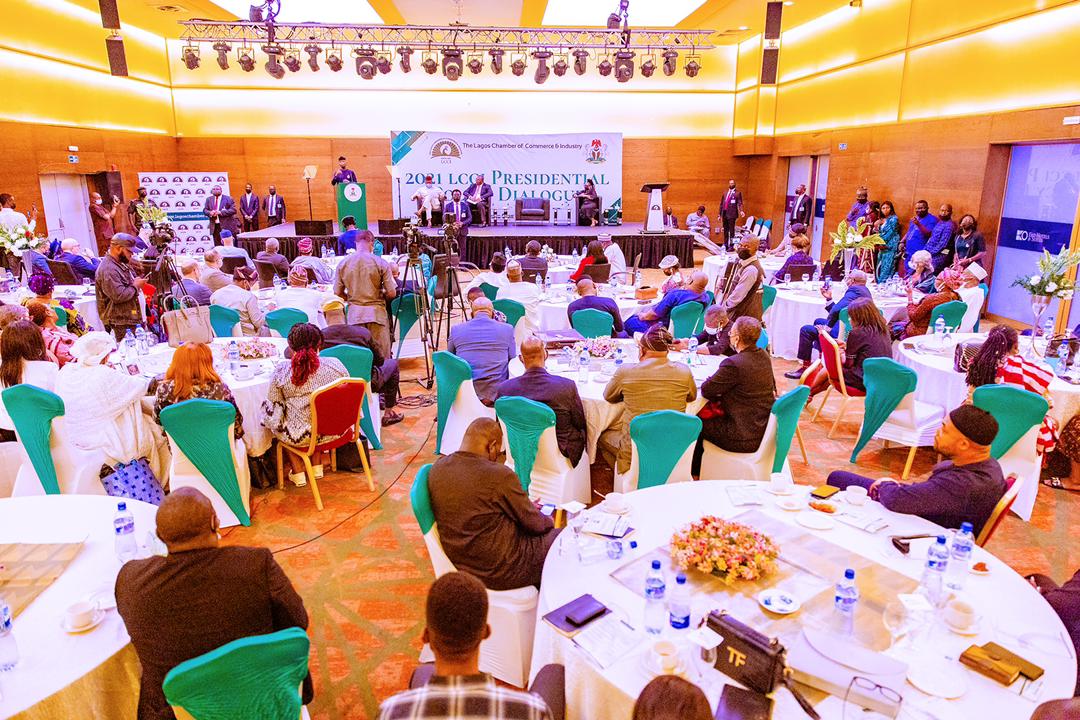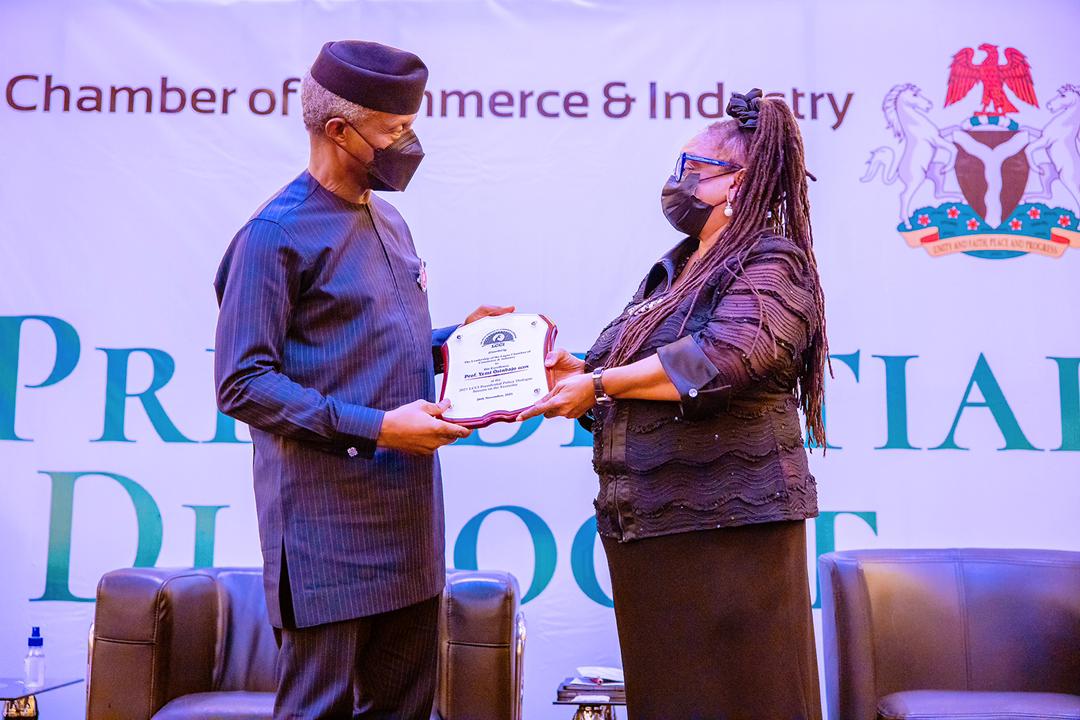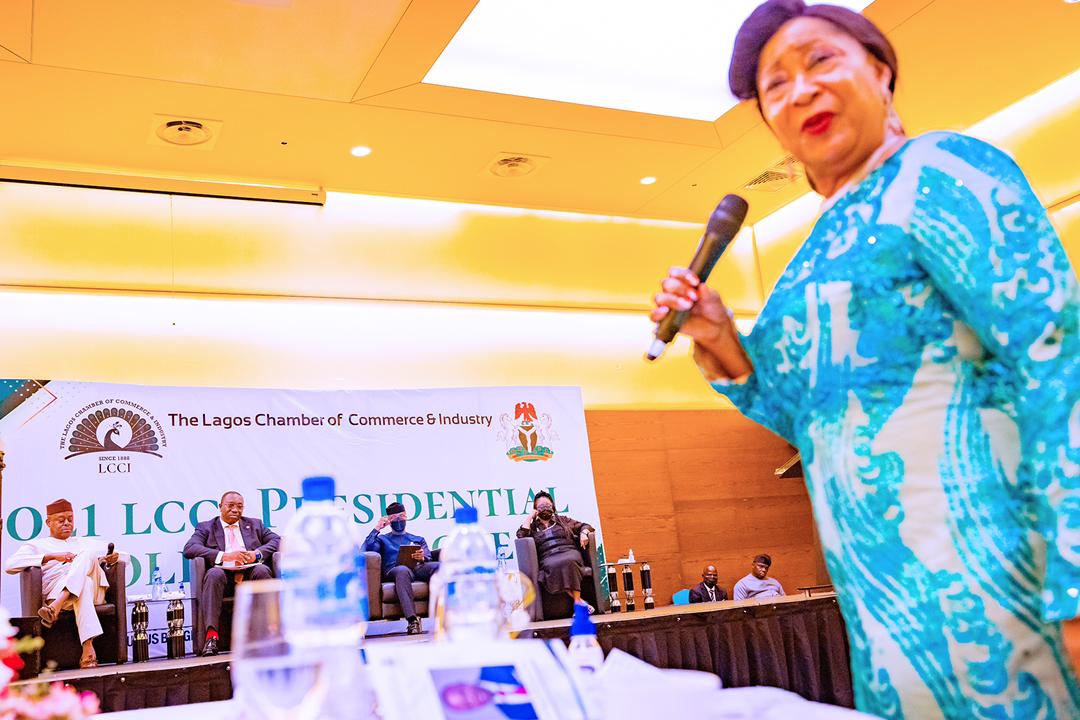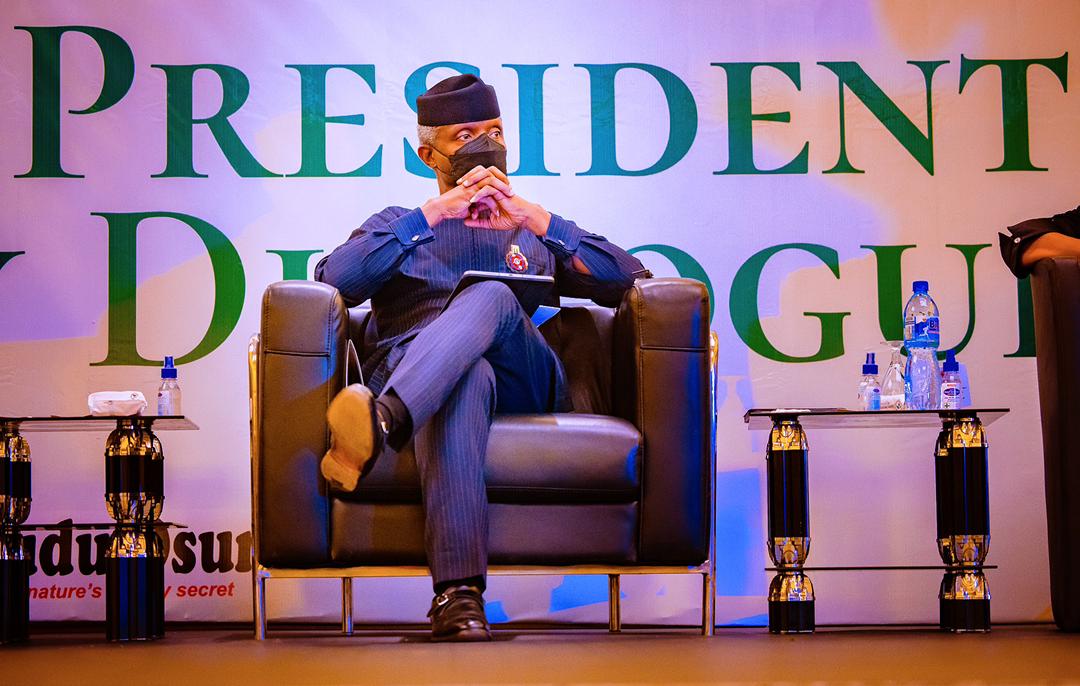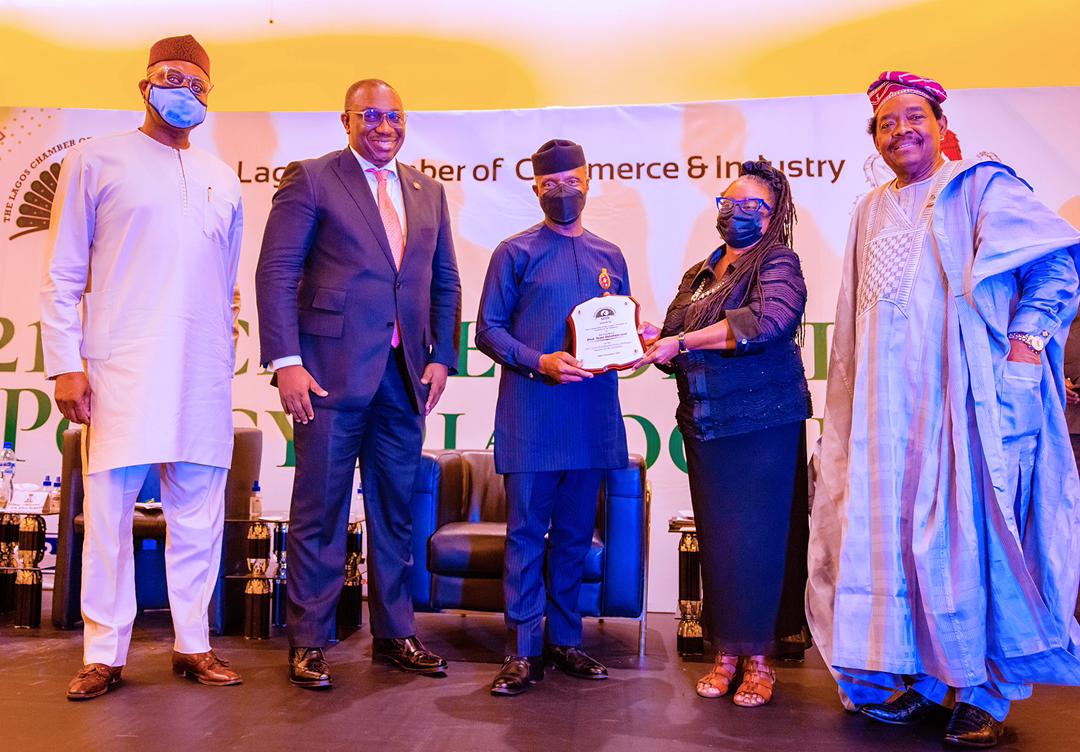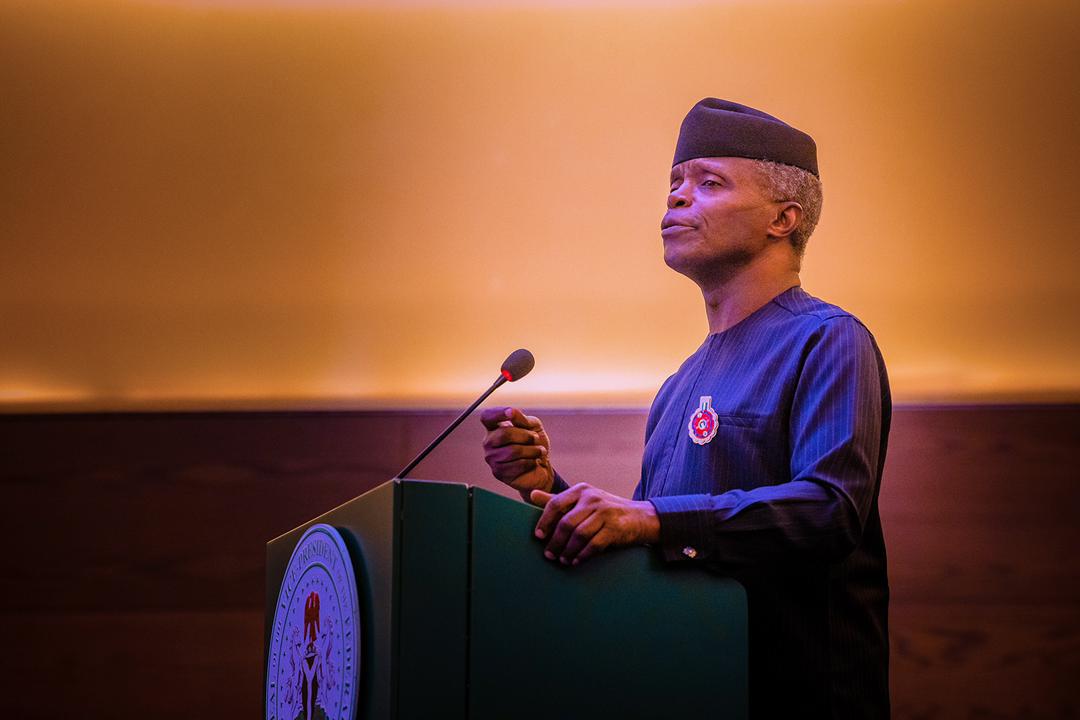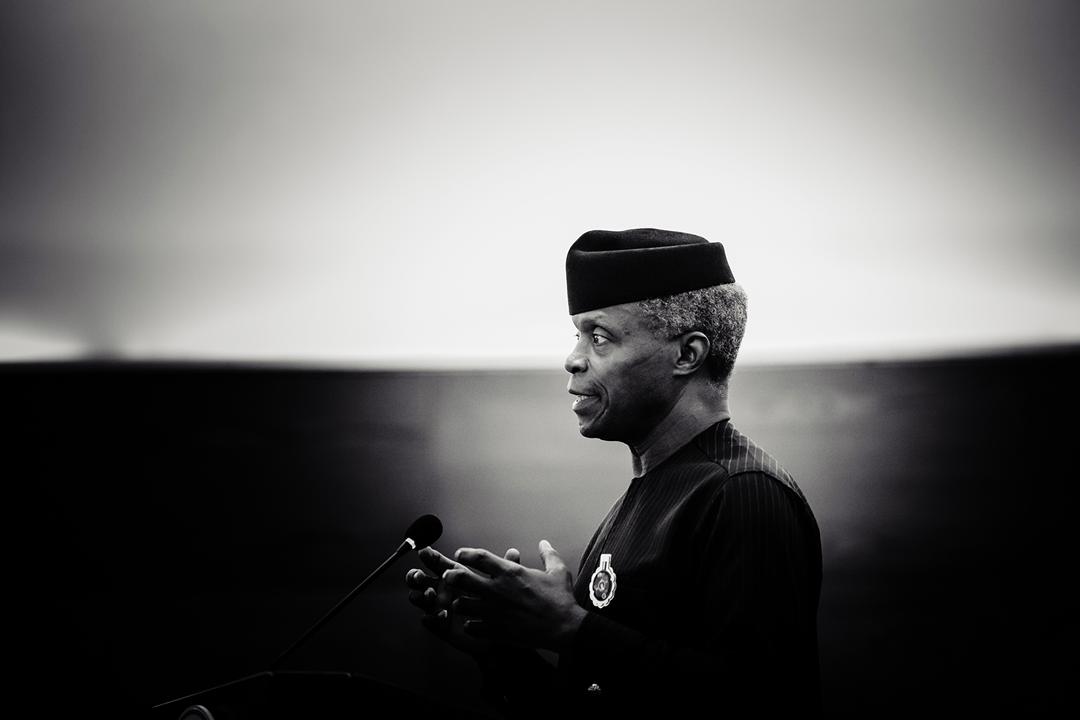Lagos Chamber Of Commerce And Industry Presidential Policy Dialogue
SPEECH BY HIS EXCELLENCY, PROF. YEMI OSINBAJO, SAN, GCON, VICE PRESIDENT OF THE FEDERAL REPUBLIC OF NIGERIA AT THE LAGOS CHAMBER OF COMMERCE AND INDUSTRY PRESIDENTIAL POLICY DIALOGUE ON THE 26TH OF NOVEMBER 2021
PROTOCOLS
President of the Lagos Chamber of Commerce and Industry, Mrs. Toki Mabogunje, thank you very much for the kind invitation to be here and my gratitude also to members of the Chamber for the very warm welcome.
I am honoured to have this opportunity to engage with this very distinguished gathering of business leaders and investors. Such is the dynamism, quality, and caliber of the membership of the Chamber that your views are considered crucial in national economic policy discourse and processes.
Let me set the tone for this dialogue by stating right away that it is imperative and we consider it as a government imperative to restore Nigeria to the path of faster growth in 2021, 2022, and beyond.
This is important in order to fully overcome the effects of recession largely caused by the COVID-19 pandemic. It is also essential because we need a growth rate that is faster than the current growth of the population so that there is enough to go round. These development ambitions as you know are vulnerable to global and local events. As we cope with the fall-out of the COVID-19 pandemic, we also have to factor in the need to mitigate and adapt to climate change and the relentless march of the digital economy and the Fourth Industrial Revolution.
As we all know, the COVID-19 pandemic precipitated not only a global health crisis but also triggered a socio-economic crisis that affected every part of the world. For us, it was clear that we were facing a near disaster. GDP contracted, as you are very familiar with, to the tune of about -6.10% during the second quarter of 2020. Oil price at one point was about $10 a barrel and this was almost less than the cost of production, and then finally settled to about $45 per barrel during the second quarter of 2020. Unemployment went up to 33.3% in the fourth quarter of 2020. The transportation sector declined by 49%, hospitality by 40%, education declined by 24%, trade declined by 17%, construction which is a big area for us declined by 40%.
In response to this, President Buhari directed that I should set up a team of Ministers and heads of inter-agencies to develop a 12-month emergency economic plan which became known as the Economic Sustainability Plan. We were clear that the only way of avoiding an economic disaster that could last for years was for government to essentially put forward a major fiscal stimulus plan. We put in place a stimulus plan in the order of about N2.3trillion, half of that was in form of credit to various sectors of the economy.
The resulting Economic Sustainability Plan, ESP, emphasized rapid health interventions, keeping businesses going, creating and protecting jobs, boosting local production, and providing social protection for the most vulnerable sections of our society.
The ESP also included a suite of macroeconomic policies including fiscal grants, tax breaks, regulatory forbearance to banks as well as reduced interest and moratorium on Central Bank of Nigeria, CBN intervention facilities amongst other things.
In addition, the plan created the MSME Survival Fund which was designed to keep as many junior private-sector workers as possible employed and paid within three months, during the period we regarded as most critical when the pandemic struck. Up to 1.1million people benefitted from this intervention.
These interventions paid off as we had a very short recession and we are now seeing a rebound in economic activity with GDP growth at about 5.01% in the second quarter of this year, and 4.03% in the third quarter.
Some people will say all sorts of things about the growth and its base effect, but I think the important thing is, what do we do going forward? I think it is clear to us that if we are to achieve accelerated growth, then we must adopt a new strategic direction and policy orientation.
It is with this objective in mind that the Federal Executive Council recently signed off on the new Medium-Term National Development Plan 2021-2025. The strategic objectives of the Medium-Term Plan include establishing a strong foundation for a diversified economy, investing in critical infrastructure, enabling human capital development and improving governance, and strengthening security.
The implementation of the Plan is expected to be supported by a range of measures of fiscal, monetary, and trade measures including reformation of subsidy regimes and a better functioning foreign exchange market.
In terms of strategic direction, increasing productivity is the cornerstone. In practical terms, this means focusing on value addition as the guiding principle for all sectors including agriculture, manufacturing, solid minerals, digital services, tourism, hospitality, sports, and entertainment.
In agriculture, for example, equal attention is given to primary production as well as other aspects of the value chain such as storage, transportation, processing, marketing, the introduction of commodity markets and we have two privates one and the public one.
Similarly, in the mining sector, we recognize that exploitation and extraction will not create jobs, our aim is to focus on resource beneficiation and development of the local industry so that we can create wealth all along the mineral value chain.
There are a number of the cardinal principles of the strategic direction which is enshrined in our National Development Plan. The first is the centrality of job creation, all programmes and policies are viewed from the lens of the number of jobs, direct and indirect, that they will create. This is important because it would influence the sorts of incentives that we would be giving sectors of the economy.
Secondly, the loosening of restrictions on trade. We believe that the generalized restrictions on trade are counter-productive especially when they impede the ability of local industries to incur critical inputs. Our focus instead would be to allow the imports of goods to which value can be added before domestic consumption or exportation.
When implemented in full, the strategic orientation of becoming a value-adding economy will help create a high number of good-paying jobs. To give some context, in Vietnam before COVID-19, the ready-made garments sector employed 3.5million people while the tourist sector in Egypt employed 2.5million people.
Although the Federal Government has undertaken direct interventions to create jobs, I think one should emphasize that our recruitment of up to 1.5million young people in the N-Power scheme over two cohorts now was just scratching the surface of the problem, as well over two million young people enter into the workforce every year. There is no doubt that the Nigerian private sector has to thrive in order to create the number and kinds of jobs that we need, but it is also important for the Nigerian youth to acquire the skills and knowledge of the workplace.
This is why we are working with development partners and some financial institutions, for example, working with United Nations Development Programme, the European Union, and other partners, we have introduced the Jubilee Fellows Programme which is a one-year work placement scheme for 20,000 young Nigerians that will kick-off next January. They will be placed in the private sector and public sector and they are paid by a special grant covered by the Federal Government, UNDP, and the EU. Over a 5-year period, we expect that 100,000 young people would be strategically placed in both private and public sectors and would have learned new work skills and after a year, they can then be released into the market.
Another key idea that the new Plan advocates is stopping the resort to demand management as the first policy option. It envisages a movement away from a strategy of managing limited supplies to one of expanding the supply base of food and manufactures as well as with regard to electricity supply, petroleum products, and foreign exchange. It also prioritizes the exports of goods and services beyond crude oil. The export is an important aspect of the entire development plan, we are building on the Export Expansion Facility Programme under the Economic Sustainability Plan.
Technology and tech-enabled businesses will be a major focus in the coming years. I think the stories we are hearing from the sector are encouraging. As of this year, 6 of such tech-enabled companies mainly in the FinTech space, have been named Unicorns. A Unicorn is a company worth over a billion dollars. 6 of those companies started in 2016, in the middle of two recessions, between 2016 and now, a global health crisis. These companies employ hundreds of young men and women in well-paying jobs, here and abroad.
The right regulatory environment was and will remain critical in growing this sector. An example is the establishment of the Creativity and Advisory Group which was established under the prerogative of the President. This group brings together public and private sector stakeholders and helps to formulate new policies, including banking policies to accommodate new tech-enabled payment systems. A lot of the FinTech companies benefitted from some of the new policies that were crafted by the Technology Advisory Group.
One of those policies is the one that enables the Central Bank of Nigeria to be able to issue licenses order than banking licenses for companies involved in payment systems. A lot of these companies would have had to become banks by force and pay N25billion. Because of the work of this advisory group, and a lot of work put in by the Central Bank of Nigeria, they were able to issue new types of licenses for payment processing and this helped a great deal in expanding the space for FinTech companies.
This is one of the reasons why the Advisory Group on Technology and Creativity which brings together public and private stakeholders articulated the need to strengthen the ecosystem of support to the digital and creative sectors. This resulted in the conceptualization of the $600million Investing in Digital and Creative Enterprises programme (i-DICE) with the African Development Bank which we hope will come operational early in 2022.
The new National Development Plan envisages an investment commitment of N348trillion over the plan period of which it is expected that Government at all levels will come up with about N49.7 trillion or about 14%, while the private sector is expected to invest N298trillion or about 86%. The success of the Plan, therefore, depends greatly on a strong partnership between the public and private sectors. We realize that if the Private Sector is not able to come up with its own part of the deal, obviously the plan itself fails.
This is why in order to encourage the private sector, the Federal Government has taken and will take deliberate steps to improve the business environment by enabling more speedy transactions and removing bureaucratic obstacles. For instance, the very first Executive Order issued by this Government, EO 001 was on promoting transparency and efficiency in the business environment. Executive Order 003 promoting support for local content in public procurement had a similar objective in mind. As they say, the devil is in the detail, but in our case, the devil is in the implementation.
This government has always emphasized that the private sector has a key role to play in our efforts to build a more resilient and competitive economy. Private companies are engaged in design, construction, logistics, and the financial components of national infrastructural projects. Just as we are fully conscious that good infrastructure is vital to enable the private sector to be efficient and competitive, we see their role in all the key areas of the economy.
This is why we are now able to use the Abuja-Kaduna railway and Lagos-Ibadan railway and talk about near completion dates for the Second Niger Bridge, Lagos-Ibadan Expressway, Abuja-Kano Expressway, and the Abuja-Kaduna-Kano gas pipeline.
The infrastructure story will be taken up a notch higher when we get to the point where the InfraCo, the N15trillion Infrastructure Fund being set up in partnership with the private sector takes off fully.
It is, of course, also important to try to shape the future trajectory of our country and we hope that the structures that helped to articulate the medium-term plan will come out with a longer-term Vision 2050.
Meanwhile, we have been working with a group of distinguished Nigerians on a futures project called ‘Imagine Nigeria’ where we have called on our young people to share their dreams about Nigeria of the future and specify some of the things that would need to be done in order to get there. We hope to be able to share the report of this project very soon as one of the things it emphasizes is the articulation of a new national narrative – a more positive one that aims to highlight our successes as a nation, forge cohesion amongst our people and foster a sense of community and common interest in our vibrant and dynamic nation.
Another issue it addresses is how Nigeria should always position itself to take a leading role in Africa. The ongoing progress in the establishment of the African Continental Free Trade Area is pertinent in this regard.
The government worked very closely with the private sector to undertake the ‘AfCFTA Impact and Readiness Assessment’ before signing up for the treaty. The private sector is also part of the National Action Committee for the implementation of the AfCFTA co-chaired by the Honourable Minister of Industry, Trade and Investment and the Honourable Minister of Finance, Budget and National Planning. The work of this Committee is vital to ensure that Nigeria can participate effectively in the Free Trade Area once trading starts.
The private sector must contribute to the articulation of the National Trade Strategy, provide support to our negotiators in AfCFTA processes while taking full advantage of the opportunities provided by this free trade area. As things stand, negotiations on the Rules of Origin, which are very important for boosting local production are at about 87.65% complete with outstanding work of about 10% on textiles and 2% relating to automobiles. In services, 41 countries have made offers, but which are still to be verified. The Phase 2 negotiations on Investments, Intellectual Property, Competition are at early stages while the conversations on Women and Youth in Trade and Digital Trade are yet to start.
Let me conclude then by reiterating the need for Nigeria to strive to achieve high and sustained growth in order to create opportunities for our people and overcome poverty. Our responses must promote productivity and value addition and move away from the despair of managing limited resources to producing and creating more in a competitive and sustainable manner.
I expect that the private sector on which so much depends and so well represented here to rise up to help Nigeria achieve these great objectives by working closely with Government.
Thank you for your kind attention.


